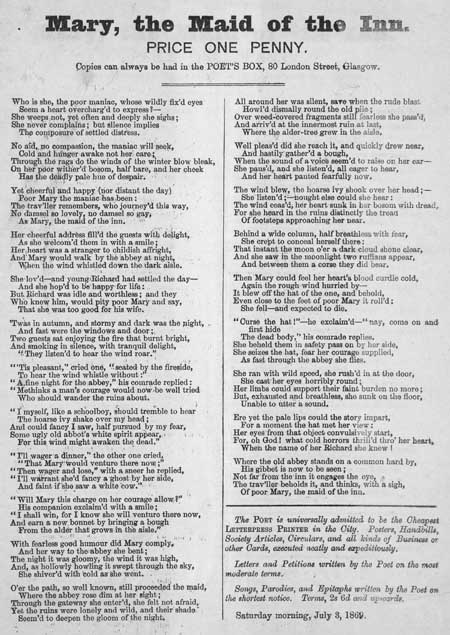Commentary
Verse 1: 'Who is she, the poor maniac, whose wildly fix'd eyes / Seem a heart overcharg'd to express? - / She weeps not, yet often and deeply she sighs; / She never complains; but silence implies / The composure of settled distress.' This poem was published on 3rd July 1869 by the Poet's Box in Glasgow, priced one penny. At the foot of the sheet it is noted 'The POET is universally admitted to be the cheapest LETTERPRESS PRINTER in the city'. The 'POET' is not named. This ballad was written in 1796 by the poet Robert Southey (1774-1843). It tells a haunting tale that is more unusual and complex than many featured in broadside ballads. Beginning with an image of Mary as a 'poor maniac', the story then moves back in time to when Mary was a carefree young girl. To settle a wager, she agrees to visit an old abbey on a stormy night, and in so doing discovers that her fiancÚ Richard is a body-snatcher. Richard is hanged, and Mary's life is ruined.
The Poet?s Box in Glasgow operated from 1849 to 1911. Matthew Leitch was the proprietor at 6 St. Andrew Lane?s, a narrow street on the south side of Gallowgate, from 1850 to 1858. His son William Munsie Leitch worked at the same address from 1859 to 1865 and at varous addresses in London Street until 1911. Many of the broadsides published by the Glasgow Poet?s Box were dated and some carried advertisements, not just for printed items but also for shoe blacking and ?soap for lovers?! Like the other ?boxes? in Dundee and Edinburgh, the Glasgow one sold love songs, sea shanties, parodies and dialogues. It is not clear what the connection between the different Poet?s Boxes were. They almost certainly sold each other?s sheets. It is known that John Sanderson in Edinburgh often wrote to the Leitches in Glasgow for songs and that later his brother Charles obtained copies of songs from the Dundee Poet?s Box. There was also a Poet?s Box in Belfast from 1846 to 1856 at the address of the printer James Moore, and one in Paisley in the early 1850s owned by William Anderson.
Early ballads were dramatic or humorous narrative songs derived from folk culture that predated printing. Originally perpetuated by word of mouth, many ballads survive because they were recorded on broadsides. Musical notation was rarely printed, as tunes were usually established favourites. The term 'ballad' eventually applied more broadly to any kind of topical or popular verse.
View Transcription | Download PDF Facsimile
|
 |
Date of publication:
1869 shelfmark: L.C.Fol.70(56)
 View larger image
View larger image
|


